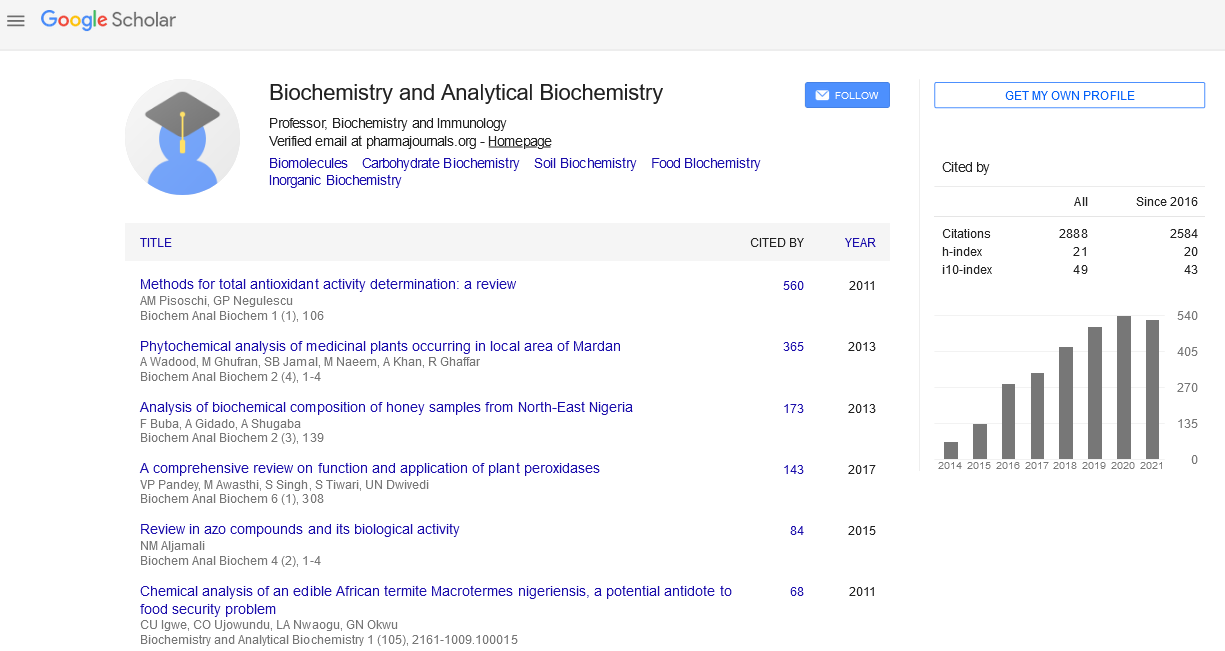Indexed In
- Open J Gate
- Genamics JournalSeek
- ResearchBible
- RefSeek
- Directory of Research Journal Indexing (DRJI)
- Hamdard University
- EBSCO A-Z
- OCLC- WorldCat
- Scholarsteer
- Publons
- MIAR
- Euro Pub
- Google Scholar
Useful Links
Share This Page
Journal Flyer

Open Access Journals
- Agri and Aquaculture
- Biochemistry
- Bioinformatics & Systems Biology
- Business & Management
- Chemistry
- Clinical Sciences
- Engineering
- Food & Nutrition
- General Science
- Genetics & Molecular Biology
- Immunology & Microbiology
- Medical Sciences
- Neuroscience & Psychology
- Nursing & Health Care
- Pharmaceutical Sciences
Development of enzyme-activated nano-conjugates for targeted hepatic cancer therapy
International Conference and Exhibition on Biochemical & Molecular Engineering
October 07-08, 2013 Hilton San Antonio Airport, TX, USA
Mohamed E. H. ElSayed
Accepted Abstracts: Biochem Anal Biochem
Abstract:
Liver cancer is the fifth most common cancer in the world accounting for approximately one million new cases per year. Surgical resection of tumor tissue is considered a good treatment option, however, only 15% - 30% of hepatic cancer patients are operative candidates and they typically exhibit a 30%-60% recurrence rate. Other treatment options include thermal and chemical ablation, chemoembolization, and regional and systemic chemotherapy. Unfortunately, these treatment strategies are highly invasive with limited specificity towards cancer cells and have failed to improve the survival of hepatic cancer patients, which remains less than 12 months. These statistics clearly indicate the urgent clinical need for innovative drug delivery systems that can shuttle a large dose of chemotherapeutic agents selectively into the cytoplasm of hepatic cancer cells to induce the desired cancer cell death without causing nonspecific toxicity to healthy organs. To address this unmet clinical need, we have designed and synthesized a new family of targeted, water-soluble, nano-conjugates that are efficiently internalized by hepatic cancer cells and selectively release their therapeutic cargo in response to the reductive effect of intracellular enzymes in a tunable fashion. This seminar will discuss the rationale behind the development of these enzyme-activated nano-conjugates, strategies to achieve tunable hepatocyte-specific release of the loaded anticancer drugs, our sugar-mediated targeting approach, and the associated anticancer activity and toxicity compared to conventional chemotherapeutic agents.
Biography :
Mohamed E. H. ElSayed received his BS of Pharmacy & Pharmaceutical Chemistry from Cairo University in May 1994. In July 2002, he obtained Ph.D. in Pharmaceutical Sciences from the University of Maryland where he investigated the effect of the physicochemical properties of dendritic carriers on their transport across epithelial and endothelial barriers under the supervision of Professor Hamidreza Ghandehari. Soon after his graduation, he joined the University of Washington, Department of Bioengineering to work with Professors Allan Hoffman and Patrick Stayton on the development of pH-sensitive polymeric carriers for delivery of therapeutic nucleic acids into epithelial cancer cells for treatment of breast cancer. In January 2007, he joined the Department of Biomedical Engineering at the University of Michigan where he has established the Cellular Engineering and Nano-Therapeutics Laboratory. His research program utilizes a multidisciplinary approach to develop bio-inspired drug delivery systems that enhance the therapeutic activity of the incorporated drug molecules while eliminating or minimizing their potential side effects with particular emphasis on rational design and synthesis of novel biomaterials for drug and gene delivery, bio-nanotechnology, and smart therapeutics. He received several honors and awards including the National Cancer Center Fellowship, Susan G. Komen Postdoctoral Fellowship, US Department of Defense Award, US National Science Foundation CAREER Award, and Coulter Foundation Translational Research Partnership in Biomedical Engineering Award.


